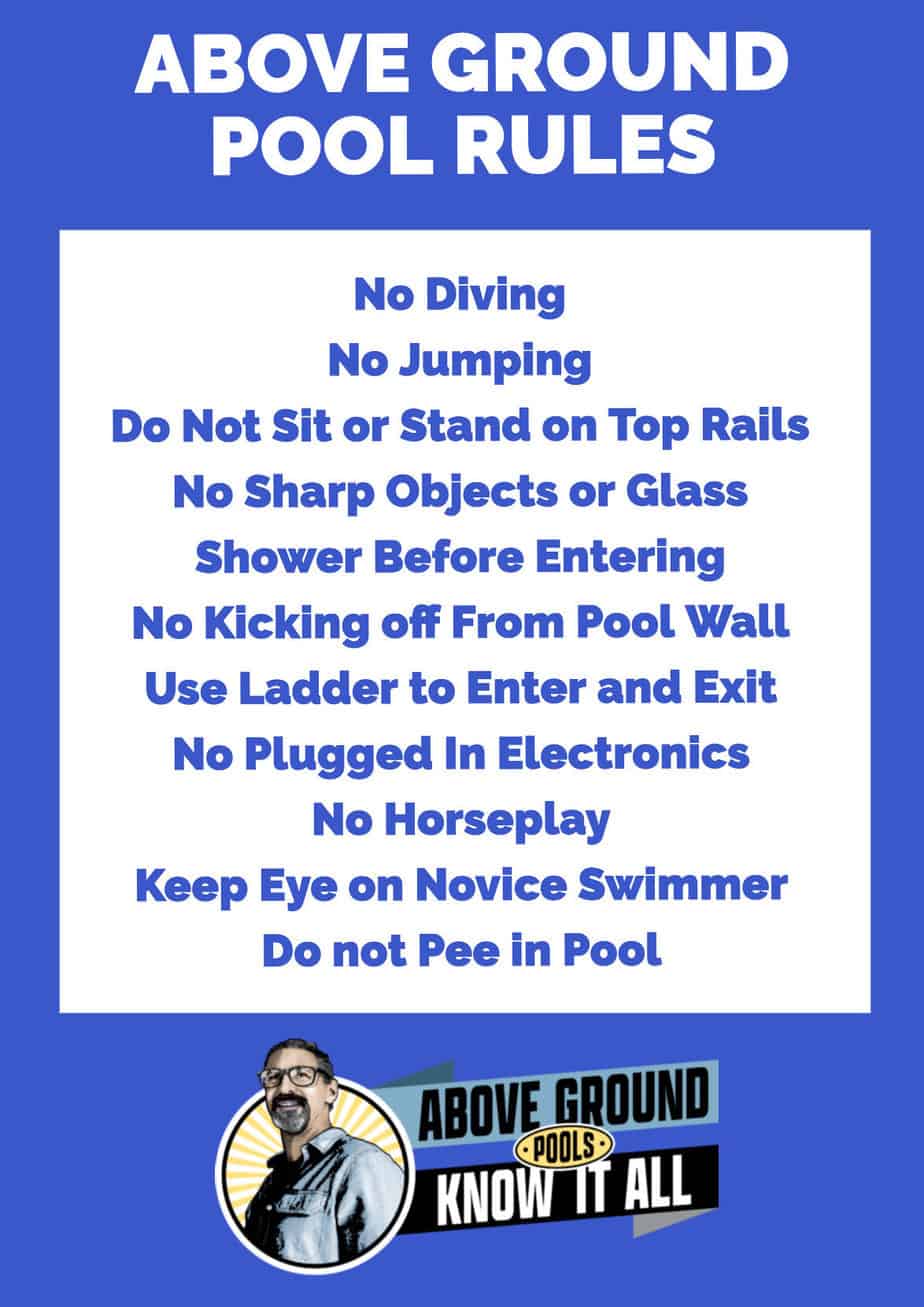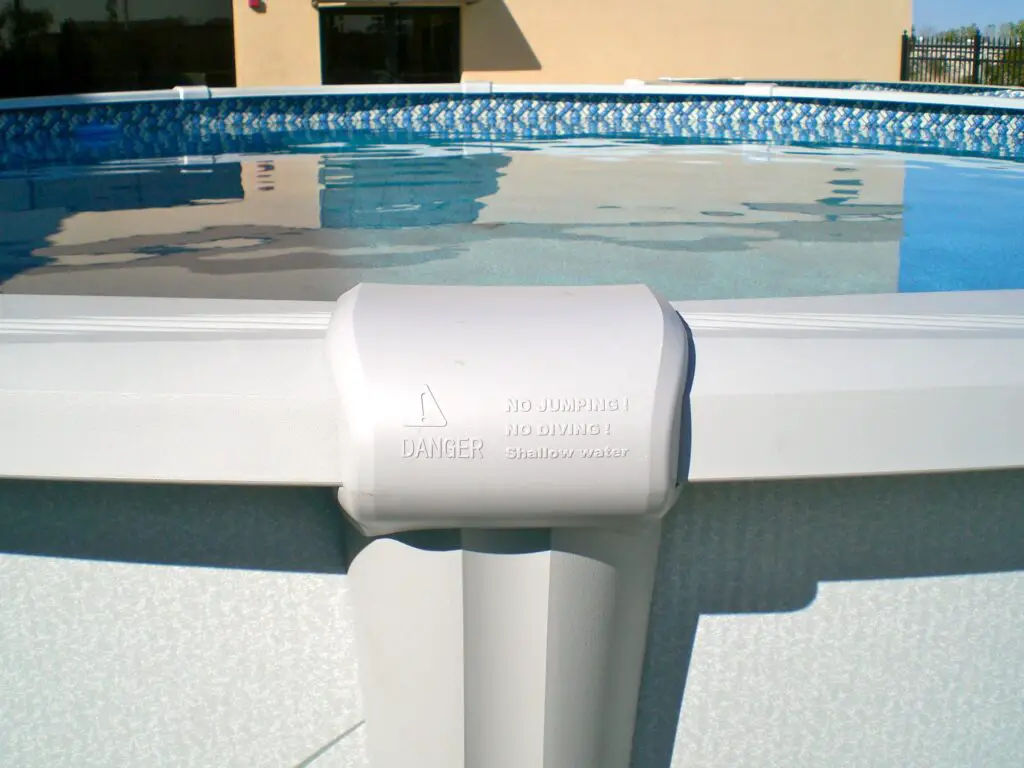You can find generic “pool rules” anywhere. Most are for commercial or concrete inground pools. What about above-ground pool rules? Are they any different?
When dealing with water, it’s always good to have some rules. This is for two primary reasons – humans cannot breathe in water and water makes things slippery.
ABOVE GROUND POOL RULES HELP PROTECT SWIMMERS AND THE POOL
Above-ground swimming pools aren’t as sturdy as ingrounds, so different rules are needed to keep them from getting damaged.
The main difference here is with the surface. Inground pools have cement, fiberglass, and thick vinyl-lined surfaces that can take a lot of damage. Above grounds have only thin vinyl-lined surfaces.
These thin vinyl surfaces are more durable than most think but will puncture if jabbed with something very sharp. They can also get damaged by things like dog paws and pool poles.
EVERYONE HAS A DIFFERENT LEVEL OF SAFETY
Above ground pools come in different types which have different costs and lifespans. This means that some just get cheap “throw-away” soft-sided types that don’t cost much and aren’t expected to last very long.
With the less expensive soft-sided pools, most don’t do much to enhance them like making a walkway or building a deck next to it. They have installed it, filled it with water, and let the family go swimming using only the cheap ladder it came with to get in and out.
Usually, the backyard rules for these cheaper pool applications are less strict as they don’t care as much about the product getting damaged since it was cheap to begin with and they don’t expect it to last very long.

Many higher-end above-ground pools are beautifully set up with very expensive decking, landscaping, and lighting. The set-up costs for this kind of above ground can be tens of thousands and are expected to last a couple of decades. These pools generally have more pool rules.
More pool rules are probably needed for these nicer setups. They will have decks attached to the pool that people can slip on or use to try to dive in the pool from. They can also have more electronic components close to the water, have greater access to the pool water, and can be designed to have more users. These things increase the need for more rules.
Safety and control are very personal, so there are many levels to managing an above-ground pool in any particular private backyard. Freedom versus security is and should be a personal-made comparison.
While deciding what rules are important for your above-ground pool, consider the following. They are very basic.
11 SWIMMER’S RULES FOR ABOVE GROUND POOLS
#1 No Diving
Diving means entering the pool from a leap “head first”. This requires enough depth in the pool (where you are diving into) for you to not hit the bottom at the end of the dive.
Back in the day, a pool needed to be at least eight feet deep for safely diving in. Now, that number has been increased to nine feet deep, which is super deep for a contemporary residential pool.
All residential pools aren’t deep enough for diving anymore. Ingrounds have to now have custom depths for diving. Most don’t go for this as it’s very expensive and many home insurance companies don’t allow it at any premium.
Above ground pools only have about four feet of depth. This means there should be NO DIVING whatsoever in an above-ground.
#2 No Jumping

Jumping is entering the water at a leap and “not head-first”. This requires less depth than diving does, which starts at four feet.
Above-ground pools are generally about four feet deep which for most is enough depth to safely jump, but it’s still not recommended. This is for two reasons – When jumping, a swimmer can slip and fall before hitting the water AND a jumper can land on another swimmer.
#3 Do Not Sit or Stand on Top Rails
This is very specific to above-ground pools because they have top railing as part of their structure.
If you get an upgraded above-ground pool, it will have a wider and sturdier top rail, but it still won’t be designed for anyone to sit or stand on it.
During the 35 years of me installing every make and model of above-ground pool, there is only one that I know of with a top rail that can be sat on. That was the Tuscany model by Doughboy. This is/was an incredibly expensive pool that isn’t worth spending for the sake of being able to sit or even stand on its top rails.
#4 No Sharp Objects in Swimming Pool
Above ground pools have vinyl liners that can easily be cut by something sharp or punctured with something very pointy.
#5 No Glass in Pool or Pool Area
There are three things to consider with glass and swimming pools. Glass can break into sharp pieces, you can’t easily see glass in water, and broken glass can cut vinyl liners and people.
For me, this is a big rule. During my years of having a pool service, I had a pool light explode in a pool once. The only way I could guarantee that I got all the little pieces of broken glass out of the water was to completely drain and clean the pool.
Yeah, broken glass in a swimming pool is very bad, Prevent this by not allowing any glass around the pool and area.
#6 Shower Before Entering the Pool
Our bodies have more micro dirt and debris than you think. And we hold a lot of dead skin and dead micro-organisms too.
Everything that enters a swimming pool will affect the pool chemistry in some small way. All the tiny things on our bodies entering the pool water will require more oxidizers (like chlorine) to get rid of them.
This is probably not too big of a deal if you don’t have a lot of swimmers and they are somewhat clean to begin with. If you just finished mowing the lawn or if your kids have been playing outside, then it’s a good idea to just shower off your bodies before getting in the pool.
#7 No Kicking Off From the Pool Wall
Metal-walled above ground pools have fairly durable walls that are designed to give some. And although they can take a fair amount of abuse, it’s not a good idea to be constantly kicking off of them as in if someone was turning to do laps.
Kids love to kick off of pool walls. Tell them that they can’t do that. This will at least slow them down from doing it. Lol.
#8 Use the Ladder to Enter and Exit the Pool
Above-ground pools are pretty safe. Most accidents that do occur will happen while getting in and out of the pool.
Kids love to scale over the wall to get in the pool or jump out of it anywhere other than where the ladder is. This could be because it’s fun or convenient.
You can probably imagine the dangers of jumping over a four-plus foot wall when there’s water making things wet. This is a good rule for safety.
#9 Warning: Above-Ground Pools are Four Feet Deep Everywhere with No Shallow End
This means that kids and people that are short don’t have a place in the water that they can stand in.
There are places to hold onto all around the pool wall and the ladder, but some who cannot swim can be uncomfortable with not having a place to stand in the pool. It’s good to make everyone that might be affected aware of this.
#10 Only Toys Made for Swimming Pools Allowed
Kids are better than adults in that they know how to have fun. And it’s fun to bring toys into the pool even if they aren’t made for water.
Toys not approved to be in pools can be sharp and can be made with metal parts. Most metal parts in toys are cheap and will rust very quickly. This can stain vinyl liners quicker and easier than you might think.
Also, sharp edges of toys can easily tear or puncture a liner in an above-ground pool as kids are playing with them. They aren’t just floating around or sitting on the bottom.
#11 No Plugged-in Electronics in the Pool
I know. This seems like very common sense but people bring their electronic devices while plugged in into pools all the time.
They may not swim with them. Often, they are sitting on a float or the top rail of the pool and not getting wet. It’s just not a good idea to bring electricity around water no matter how careful everyone is.
Keep in mind too that it’s a good idea to keep most battery-powered electronics from being in the pool. Unless very waterproof, a quick “oops, I dropped it in the water” may ruin your device.
OPTIONAL POOL RULES FOR SWIMMING IN ABOVE GROUND POOLS
As mentioned earlier, everyone has different levels of security and control. Here are some optional rules for your above ground.
#12 No Horseplay
I’m not sure where this term “horseplay” came from, but we all know what it means. You may not want to allow kids to play too roughly with each other in the pool.
And not allowing drunk adults to horseplay in the pool may be a good idea too. #itsallfunandgamesintilsomeonegetshurt
#13 Keep an Eye on Young Swimmers
Making this a rule may ensure older brothers/sisters and visiting people keep more of a watchful eye on kids that can’t touch the bottom yet or aren’t strong swimmers.
#14 Do Not Run Next to the Pool
Many above-ground pools have high decks attached to them. Running along the pool on a high deck can be dangerous for sure.
#15 No Food in the Pool
Food getting in the pool water gets soggy and nasty and disperses quickly. That can make the pool a mess and take away someone’s desire to get in it. No one likes food floating around in a swimming pool. Yuk.
#16 Do Not Pee in the Pool
In reality, peeing in a pool occasionally doesn’t hurt it much (don’t tell kids this). The pee will cause the use of more chemicals, but that’s about it.
It’s really more the thought of swimming in pee that is what people want to avoid. If there are kids and drunk adults in the pool, there will be peeing for sure. Making it a rule will at least decrease the frequency.
#17 No Dogs or Animals in the Pool
People love their dogs. Some love dogs more than people. If you are one of these, then this rule won’t work for you.
Dogs and pet animals do add hair to the filter and claws can damage the liner in an above ground pool. I have seen more than a few liners damaged by a dog paddling next to the pool wall and hitting the vinyl.
Some just don’t want the stress of having any pets in their liquid sanctuary. I get that.

